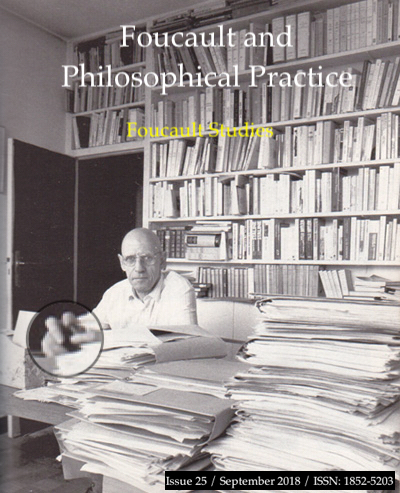Vrais Amis: Reconsidering the Philosophical Relationship Between Foucault and Deleuze
DOI:
https://doi.org/10.22439/fs.v0i25.5580Keywords:
Foucault, Deleuze, desire, pleasure, micropolitics, resistanceAbstract
In the current literature addressing the Foucault/Deleuze relationship, there is a clear tendency to either replicate and expand Foucault’s over-simplified rejection of Deleuzian desire as already caught in a discursive trap or play of power; or to replicate Deleuze and Guattari’s over-simplified reading of Foucault’s dispositif, in which power and resistance are deemed opposed and thus understood via a structure of negativity. In either case, each thinker is accused of referring to an asocial or essentialist multiplicity, typically in the form of a real transcendence (positive Body), which is deemed ‘inconsistent’ with their post-structuralist yearnings. This article argues that there is in fact a real and enduring consistency between the two thinkers, which is to be found in the mutual use of an ontology of ‘pure’ or ‘disjunctive’ immanence – as derived from and developed through Nietzsche’s method of genealogy – as a way to construe power/subjectification, with pleasure/desire taken as the affective inside of this power. That said, the somewhat semantic difference between desire and pleasure being proposed does lead to a slight, though tangible, divergence in politico-ethical and practical possibilities. This article concludes that it is this divergence that should from the real basis of debate.References
Badiou, Alain, Deleuze: The Clamor of Being. London: University of Minnesota Press, 2000.
Beckman, Frida, Between Desire and Pleasure: a Deleuzian Theory of Sexuality. Edinburgh: Edinburgh University Press, 2013.
Best, Steve and Kellner, Douglas, Postmodern Theory: Critical Interrogations. Basingstoke: Palgrave Macmillan, 1991.
Beth Mader, Mary, Sleights of Reason: Norm, Bisexuality, Development. Albany: State University of New York Press, 2011.
Butler, Judith, The Psychic Life of Power: Theories in Subjection. Stanford: Stanford University Press, 1997.
Butler, Judith, Subjects of Desire: Hegelian Reflections in Twentieth-Century France. New York: Columbia University Press, [1987] 2012.
Deleuze, Gilles, Logic of Sense. London: Continuum, [1969] 2004.
Deleuze, Giles, The Fold: Leibniz and the Baroque. London: Continuum, [1988] 2006.
Deleuze, Gilles, Nietzsche and Philosophy. London: Continuum, [1962] 2006.
Deleuze, Gilles, “Desire and Pleasure” in D. Lapoujade (ed.) Two Regimes of Madness. New York: Semiotext(e), 2007.
Deleuze, Gilles and Guattari, Felix, Anti-Oedipus: Capitalism and Schizophrenia. London: Continuum, [1972] 2004.
Deleuze, Gilles and Guattari, Felix. A Thousand Plateaus: Capitalism and Schizophrenia. London: Continuum, [1980] 2004.
Dews, Peter, Logics of Disintegration: Post-Structuralist Thought and the Claims of Critical Theory. London: Verso, 2007.
Eribon, Didier, Michel Foucault. London: Faber & Faber, 1992.
Foucault, Michel, “The Confession of the Flesh” in Power/Knowledge: Selected Interviews and Other Writings 1972-1977, ed. Colin Gordon. New York: Vintage Books, 1980.
Foucault, Michel, “Truth and Power”, Power/Knowledge: Selected Interviews and Other Writings 1972-1977, ed. Colin Gordon. New York: Vintage Books, 1988.
Foucault, Michel, Discipline and Punish: The Birth of the Prison. London: Penguin, [1975] 1991.
Foucault, Michel, The Use of Pleasure: The History of Sexuality Volume 2. Trans Robert Hurley. London: Penguin, [1984] 1992.
Foucault, Michel, The Will to knowledge: The History of Sexuality: Volume One. London: Penguin, [1978] 1998.
Foucault, Michel, “Structuralism and Post-structuralism”, in Michel Foucault: Aesthetics: Essential works of Foucault 1954-1984, ed. James. D. Faubion. London: Penguin Books, 2000.
Foucault, Michel, “The Subject and Power”, in Michele Foucault: Power: Essential Works of Foucault 1954-1984, ed. James D. Faubion. London: Penguin Books, 2001.
Foucault, Michel, “Truth and Juridical Forms”, in Michele Foucault: Power: Essential Works of Foucault 1954-1984, ed. James D. Faubion. London: Penguin Books, 2001.
Foucault, Michel, The Archaeology of Knowledge. London: Penguin, [1969] 2002.
Foucault, Michel, et al. “The Gay Science,” Critical Inquiry, Vol. 37: 3, (2011), 389.
Farrell Fox, Nik, The New Sartre: Explorations in Postmodernism. London: Continuum, 2003
Freud, Sigmund, “On the Pleasure and the Reality Principle”, in The Essential Freud, ed. Ana Freud. London: Vintage, 2005, 505-517.
Grace, Wendy, “Faux Amis: Foucault and Deleuze on Sexuality and Desire”, Critical Inquiry, 36:1, 2014. DOI: 10.1086/606122
Habermas, Jürgen, The Philosophical Discourses of Modernity. Cambridge: The MIT Press, 1987
Hardt, Michael and Negri, Antonio, Empire. London: Harvard University Press, 2000.
Hendley, Steve, Reason and Relativism: A Sartrean Investigation. New York: State University of New York Press, 1991.
Holland, Eugene, “Deleuze and Psychoanalysis”, in The Cambridge Companion to Deleuze, Daniel W. Smith and Henry Somers-Hall. Cambridge: Cambridge University Press, 2012.
McCumber, John, Time and Philosophy: A History of Continental Thought. Durham: Acumen, 2011.
Miller, James, The Passion of Michel Foucault. London: Flamingo, 1994.
Nietzsche, W. Friedrich, The Will to Power. New York: Vintage Books, [1901] 1968.
Olssen, Mark, Michel Foucault: Materialism and Education. London: Paradigm, 2006.
Racevskis, Karlis, Michel Foucault, Rameau’s nephew and the question of identity, in The Final Foucault, eds. James Bernauer and David Rasmussen. Cambridge: MIT Press, 1991
Simons, Jon, Foucault & the political. London: Routledge, 1995.
Sluga, Hans, “Foucault’s Encounter with Heidegger and Nietzsche”, in The Cambridge Companion to Foucault, ed. Gary Gutting. Cambridge: Cambridge University Press, 2003.
Widder, Nathan, “Foucault and Power Revisited”, European Journal of Political Theory, 3:4, (2004), 411-432. DOI: 10.117721474885104045913
Widder, Nathan, “Two Routes from Hegel” in Radical Democracy: Politics Between Abundance and Lack, eds. L. Tønder and L. Manchester, Manchester University Press, 2005.
Wolin, Richard, The Seduction of Unreason: The Intellectual Romance with Fascism, from Nietzsche to Postmodernism. Oxford: Princeton University Press, 2004.
Žižek, Slavoj ,The Ticklish Subject: The Absent Centre of Political Ontology. London: Verso, 1999.
Žižek, Slavoj, Bodies without Organs: On Deleuze and Consequences. London: Routledge, 2012
Downloads
Published
How to Cite
Issue
Section
License
Authors retain copyright to their work, but assign the right of the first publication to Foucault Studies. The work is subject to a CC BY-NC-ND 4.0 license, but despite these restrictions, authors can take for granted that Foucault Studies will permit articles published in Foucault Studies to be translated or reprinted in another format such as a book providing a full reference is made to Foucault Studies as the original place of publication.



